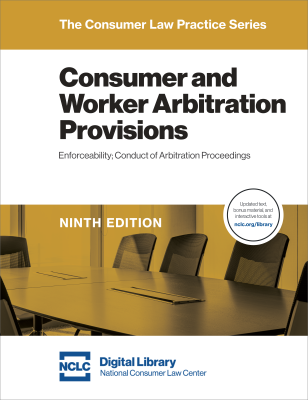On July 10, the CFPB issued its long-awaited rule limiting the effect of mandatory arbitration agreements involving specified consumer financial products and services, and the rule was published nine days later in the Federal Register at 82 Fed. Reg. 33,210 (July 19, 2017). The full notice is found here (hereinafter "notice"); the supplementary information begins on 33,210 and the rule begins on 33,428.
The final rule prohibits financial services providers from using an arbitration agreement that prevents consumers from filing or participating in a class action. In short, arbitration requirements will no longer be able to prevent consumers from bringing class actions in court at least when consumers sue certain financial services providers. On the other hand, the rule does not limit a provider's ability to force an individual action into arbitration.
When Does The Rule Go Into Effect
The rule only applies to arbitration agreements “entered into” on or after March 19, 2018. See 12 CFR § 1040.5(a) (herein called the "trigger date").
"Entered into" is a term of art defined in the rule's Official Interpretations § 1040.4-1. It includes new contracts as well as certain pre-existing arbitration agreements. Examples of an arbitration agreement "entered" into after the trigger date include when:
- a pre-existing agreement is assigned to a covered provider after the trigger date, as long as the provider becomes a party to the arbitration agreement;
- after the trigger date an arbitration clause is added to a pre-existing consumer agreement;
- after the trigger date a new product or service is sold that is covered by a pre-existing arbitration agreement where the provider is a party to that arbitration agreement.
An agreement is not entered into after the trigger date if it is only modified or amended and does not constitute a new product or service.
Challenges Facing the Rule's Implementation
Legislative opposition to the rule is expected and the most immediate challenge will be under the Congressional Review Act, 5 U.S.C. § 801, et. seq. Senator Tom Cotton initiated that process on July 11, 2017. Under the Review Act, Congress has 60 legislative days to repeal the rule by a majority vote of the House and the Senate and the President's signature. The Senate vote cannot be filibustered. If repealed, the CFPB will be prohibited from reissuing the rule or a new rule in substantially the same form unless specifically authorized by Congress. See 5 U.S.C. § 801(b)(2).
The Rule is likely to face court challenges as well. The CFPB is given legislative authority to prohibit or impose conditions on the use of arbitration agreements, consistent with the study that Congress mandated the CFPB to conduct on the use of arbitration agreements. See 12 U.S.C. § 5518. The CFPB in March, 2015, submitted a comprehensive 725 page study so that any rule challenge may face an uphill battle. Nevertheless, it is possible that litigation could delay the rule's implementation.
The Rule's Coverage
The rule prevents an arbitration clause from keeping a class action out of court. 12 CFR § 1040.4(a). But the rule does not prevent an individual action from being forced into arbitration. It simply requires that creditors or other providers submit to the CFPB certain information about individual arbitrations in which they are involved. See 12 CFR 1040.4(b).
Key to understanding the Rule's coverage is the distinction between two terms—a "covered person" and a "provider." A covered person is defined at 12 USC 5481(6) to broadly include any person that offers or provides a consumer financial product or service and any affiliated service provider of that person. A provider is a narrower term because it excludes certain covered persons from its definition—notably most merchants, retailers, or other sellers of nonfinancial goods or services even when offering credit.
The rule only places obligations on providers, but also applies to agreements entered into by covered persons. For example, an automobile dealer, even one originating credit that it later assigns to a lender, is not a provider and has no obligations under the rule. The dealer can use an arbitration clause to force a class action against the dealer into arbitration.
On the other hand, the dealer originating credit is a covered person and when the dealer assigns the credit agreement to a lender, that lender, being a provider, does have obligations under the rule. A class action against the dealer's assignee will not be able to be forced into arbitration. See Official Interpretations § 1040.2(c)-1(ii).
The same result occurs if the auto dealer hires a debt collector. The auto dealer has no obligations under the rule, but the rule does apply to the debt collector. See Official Interpretations § 1040.4-ii.
As a result, the rule generally applies to creditors and debt collectors (see below), but does not apply to most automobile dealers, vocational schools, nursing homes, manufactured home dealers, or other sellers. The rule also applies only to those offering consumer financial products or services, and thus does not apply to an employee's action against an employer or an investor's action against a stock broker.
The rule though does apply to the following:
- extending consumer credit, participating in consumer credit decisions, or referring or selecting creditors for non-incidental consumer credit, each when done by a creditor under Regulation B implementing the Equal Credit Opportunity Act, acquiring or selling consumer credit, and servicing an extension of consumer credit;
- extending or brokering automobile leases as defined in Bureau regulation;
- providing services to assist with debt management or debt settlement, to modify the terms of any extension of consumer credit, or to avoid foreclosure, and providing products or services represented to remove derogatory information from, or to improve, a person's credit history, credit record, or credit rating;
- providing directly to a consumer a consumer report as defined in the Fair Credit Reporting Act, a credit score, or other information specific to a consumer derived from a consumer file, except for certain exempted adverse action notices (such as those provided by employers);
- providing accounts under the Truth in Savings Act and accounts and remittance transfers subject to the Electronic Fund Transfer Act;
- transmitting or exchanging funds (except when necessary to another product or service not covered by this rule offered or provided by the person transmitting or exchanging funds), certain other payment processing services, and check cashing, check collection, or check guaranty services consistent with the Dodd-Frank Act; and
- collecting debt arising from any of the above products or services by a provider of any of the above products or services, their affiliates, an acquirer or purchaser of consumer credit, or a person acting on behalf of any of these persons, or by a debt collector as defined by the Fair Debt Collection Practices Act.
See 12 CFR § 1040.3(a).
Other Restrictions on Mandatory Arbitration Requirements
It is critical that practitioners be aware of existing limits on mandatory arbitration requirements other than those found in the CFPB rule. This is because of the CFPB rule's delayed effective date, its application only to class actions, it's limited coverage, and potential legislative and litigation challenges to the rule. What follows is a thumbnail description of recent developments and existing challenges to arbitration clauses, more fully developed in NCLC's Consumer Arbitration Agreements (7th ed. 2015), updated online at www.nclc.org/library.
- Federal law prohibits mandatory arbitration agreements related to home mortgages and manufactured home loans. Id § 4.2.2.1. While this prohibition certainly applies to any mortgage loan extended starting June 1, 2013, it possibly is retroactively applied, at least as to federal claims. Id § 4.2.2.2.
- Effective October 3, 2016, federal law prohibits mandatory arbitration involving most unsecured closed-end consumer credit involving military personnel or their dependents. This prohibition is extended to credit cards and other open-end credit effective October 3, 2017 (unless delayed by the Secretary of Defense). See Id. § 4.2.3.
- The Department of Education issued a rule that would have prohibited schools participating in the federal Direct Loan Program from enforcing arbitration clauses effective July 1, 2017 (see id. § 4.2.4a), but the rule's implementation has been delayed. That delay is subject to two court challenges, including one by 18 state attorneys general.
- The Department of Health and Human Services Center for Medicare and Medicaid Services announced a rule that would include a provision that would cut off Medicare and Medicaid funding to nursing homes that enforced arbitration clauses, but a federal court on November 6, 2016 issued a preliminary injunction in American Health Association v. Burwell, 2016 WL 6585295 (N.D. Miss. Nov. 7, 2016). and the Trump administration has proposed to amend the rule to eliminate the arbitration provision. See 82 Fed. Reg. 26649 (June 8, 2017). Comments on the proposal to rescind the nursing home rule are due August 7.
- A recent Supreme Court decision also deals with whether a nursing home resident or the resident's estate is bound by an arbitration clause found in the admissions agreement signed by a family member. See Kindred Nursing Ctrs. v. Clark, __S.Ct.__, 2017 WL 2039160 (May 15, 2017). This decision and related cases are analyzed in a recent NCLC article.
- The National Labor Relations Board announced in In Re D. R. Horton, Inc., 357 NLRB 2277, 2286-87 (2012) that the National Labor Relations Act prohibits the use and enforcement of class waivers (whether or not in arbitration clauses) in agreements between employees and employers. This ruling recently has been approved by the Seventh and Ninth circuits, See Morris v. Ernst & Young, LLP, 834 F.3d 975 (9th Cir. 2016); Lewis v. Epic Sys. Corp., 823 F.3d 1147 (7th Cir. 2016). But it had previously been disapproved by the Second, Fifth and Eighth circuits. The Supreme Court has now granted certiorari at 137 S.Ct. 809 (Jan. 13, 2017) and a decision is expected in 2018.
- The Magnuson-Moss Warranty Act allows warrantors to require that consumers first resort to non-binding informal dispute resolution mechanisms to resolve their written warranty claims. 15 U.S.C. § 2310(a)(3). In May 2015, the FTC reaffirmed its long-held view that warrantors cannot rely on binding arbitration to resolve warranty claims, despite earlier court decisions that had disapproved of this FTC position. Id § 4.3.2.
- An arbitration requirement may be in conflict with the proper operation of a bankruptcy proceeding and the bankruptcy judge in some cases may disregard the arbitration requirement. See Id. § 4.3.3.
- The Carmack Amendment to the Interstate Commerce Act may prohibit interstate freight carriers from requiring consumers to agree to arbitrate claims regarding loss or damage to property. Id. § 4.3.5.
- The defendant's conduct may waive the right to require arbitration, as examined in this article.
- New case law examines consumer rights where the defendant enforces an arbitration requirement but then refuses to pay for the arbitration, as described in another NCLC article.
- Unconscionable arbitration provisions can be struck down or the whole requirement can be made unenforceable. See NCLC's Consumer Arbitration Agreements ch. 6. The same is the case for provisions that conflict with federal statutory rights. Id. ch 4.
- An arbitration requirement is not enforceable if the defendant cannot produce the arbitration agreement or that agreement has not been properly consummated or otherwise formed, or has been superseded by another agreement. See id. ch. 5.
- If the plaintiff or defendant is not listed in the arbitration agreement, the agreement may not be applicable to litigation involving those parties. The same is the case for disputes not covered by the language of an arbitration agreement. Id. ch. 7.
- State law limiting arbitration in insurance agreements may supersede the Federal Arbitration Act by operation of the McCarren Ferguson statute. See id. § 3.4.5.
- States can take actions to limit mandatory arbitration, and such actions need not be preempted by the Federal Arbitration Act. See NCLC's Model State Consumer and Employee Justice Enforcement Act .


